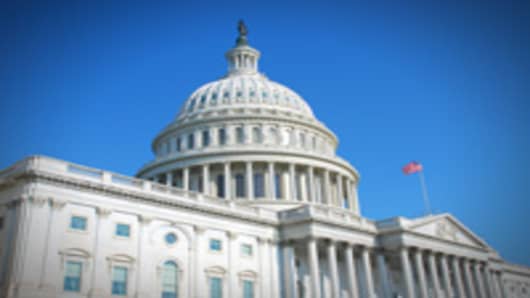U.S money market funds are stockpiling cash in case Congress fails to raise the debt ceiling, distorting the short-term market for U.S government debt and raising borrowing costs for banks and other financial institutions.
While the funds will continue to hold U.S Treasuries in the event of a downgrade or default, they are building up liquidity and shunning certain securities due to fears that a failure to raise the debt ceiling could trigger client redemptions.
The moves come as Republican leaders in the House of Representatives were planning to bring their plan to raise the debt limit up for a delayed vote on Thursday, but there was widespread uncertainty over the bill’s ability to pass the lower chamber of Congress because of defections among some rank-and-file conservatives and firm opposition from Democrats.
Late on Tuesday, there was further confusion about the Republican plan after Mr Boehner’s office said staffers were attempting to rewrite the proposal in light of an estimate by the Congressional Budget Office that said the bill would save less money over 10 years than Republicans had been aiming for.
A decision to withdraw the legislation, or its failure to advance, could unsettle markets. Democrats in the Senate have proposed their own version of an increase in US borrowing authority, backed by the White House, which could be the basis for compromise with the Republican plan.
Government-only money market funds have boosted the amount of cash available to meet redemptions within one week to 68 percent of assets, from 48 percent at the end of March, according to Barclays Capital. “We’ve built up liquidity with a rather meaningful amount of maturities prior to the debt ceiling,” said Robert Brown, head of Fidelity’s money market business.
Banks are also holding more cash and US corporations are postponing decisions due to uncertainty about where to invest cash amid fears that a failure to raise the debt ceiling would trigger a credit rating downgrade and possible default.
Money market funds are avoiding the one-month Treasury notes which mature on August 4 and August 11. “Those are the securities most vulnerable to some sort of change,” said Joseph Abate, strategist at Barclays Capital.
The interest rates offered by the two one-month debt securities are more than twice the rate for lending the government money on a three-month note maturing in September.
Money market funds, which hold $338 billion of US government debt, according to Citigroup, are also reducing the amount of time they are willing to lend. This could raise funding concerns for banks, as they are reliant on short-term borrowing in the repurchase or repo market.
Despite the jitters, the US sold $35 billion in two-year notes at a yield of 0.417 percent on Tuesday, better than expected although demand was lighter.
“Their concern is that if they do a three-month trade, who knows what might happen within those three months?” said Mr Abate.
In the event of a downgrade, money market funds are unlikely to become forced sellers. The regulations require a series of steps, including undertaking a credit analysis of the securities in question, but do not mandate sales.
Even money market funds rated triple A will be able to hold securities which are not themselves triple A rated, provided that the US retains at least a single A rating.
Under more drastic default scenarios, funds could also continue to hold government debt assuming that the default is temporary: a commonly heard reference is a chastened Congress passing the Troubled Asset Relief Program in 2008 after the stock market plummeted in reaction to its initial no vote.
They would then leave the proceeds of maturing notes uninvested. Yields on short-term money are already so low that “the cost of doing that today is almost nil”, said the head of one money market trading desk.
Providing some reassurance to money market providers, however, is the lack of an alternative to US government debt in the size and volume required by clients.
“It’s a question of whether a flight to quality – when there isn’t another instrument of quality out there – invokes the same kind of panic”, said Deborah Cunningham, head of money markets for Federated Investors.


